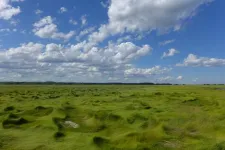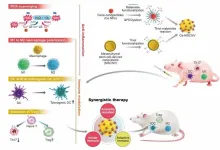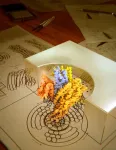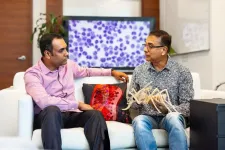(Press-News.org)
Leading researchers have launched a major scientific initiative to investigate - and help protect - the fragile Congo Basin Forest region in central Africa, one of the world’s most important but little understood ecosystems.
They say the Congo Basin Science Initiative will transform the understanding of the Congo Basin, an area of 240 million hectares of contiguous tropical forests that absorb a vast quantity of carbon, which helps to moderate the impact of global climate change.
The Initiative has been launched at the Three Basins Summit, a major gathering to discuss the world’s three large tropical forest regions being held in Brazzaville, Republic of the Congo.
At the summit, leading researchers - including Professor Stephen Lewis, a prominent expert on the Congo forests from the University of Leeds and University College London – highlighted the stark difference between what scientists know about the Congo Basin and what they know about the Amazon Forest in South America, which has been the subject of intense scientific enquiry through what is known as the Large-Scale Biosphere-Atmosphere Experiment or LBA.
Involving 120 projects and 1700 researchers, the decade-long scheme in the Amazon has revealed the critical role that the Amazon Rainforest plays in regulating the Earth’s climate. It has also helped train local scientists and has put Brazil at the forefront of rainforest science.
The researchers meeting in Brazzaville aim to replicate that approach with the creation of the Congo basin Science Initiative.
Professor Raphael Tshimanga, a leading expert on the Congo Basin based at the University of Kinshasa in the Democratic Republic of the Congo and one of the leaders of the project, said: "The Congo basin is a vast and important area that straddles central Africa, the world’s second green lung after the Amazon.
“If we can replicate what has been achieved through investing in research in the Amazon, we will be in a much stronger position to understand the threats to this unique African ecosystem not only from climate change but also from deforestation and pollution from mining and oil exploration.”
Key scientific questions
Scientists have drawn up key scientific questions that need to be answered to assess the health of the Congo Basin forests.
Professor Lewis, who helped to develop the science plan for the Initiative with scientific colleagues in the Congo region, said: “In the Amazon, scientists have uncovered a tipping point where beyond a certain level of deforestation and climate change will lead to a mass die-back of the southern and eastern part of the Amazon.
“In the Congo Basin, scientists do not know if there is a tipping point, because we do not yet have the data to investigate this.”
Underinvestment in Congo Basin science
The scientists argue that there has been “severe underinvestment” in the science to understand the Congo Basin and many barriers to researchers to lead high-level studies.
In recent years, only 11% of international funding for forest protection and sustainable management in tropical areas has been channelled to projects in the Congo Basin, whereas 34% went to the Amazon and 55% to southeast Asia.
The lack of investment meant that in the latest IPCC global climate assessment, the Congo Basin was one of only two location in the world without sufficient data needed to assess past trends in extreme heatwaves.
The meeting in Brazzaville is calling for $100 million to be invested in a ten-year science programme focussed on the Basin region, with a further $100 million to give PhD training to scientists from the Congo region. Once qualified, those scientists will be able to lead and co-ordinate complex studies.
Funding would have to come from international donors, UN agencies and philanthropists. The researchers say with international spending on research and development hitting $2.4 trillion in 2020, the funding needed to understand and protect the world’s second tropical forest is relatively modest.
Professor Lewis added: “Central Africa needs more scientists who can monitor the forests, rivers and climate of the region. Central Africa needs more scientists who can advocate for evidence-based policy, so that these countries can develop and become prosperous, but without the mass-scale destruction of nature that has occurred in places like the UK.”
Congo Basin
The Congo Basin forests are a global biodiversity hotspot and home to elephants, gorillas, chimpanzees and bonobos. Rainfall from the region is recycled by the forests and transported beyond central Africa, feeding rivers that are used by 300 million people as far afield as Ethiopia and Egypt.
There are major discoveries being made in the Congo Basin, with scientist recently mapping the world’s largest tropical peatland, and many species that are new to science, with recent finds including a new species of gecko, an air-breathing catfish, and a new species of coffee.
But experts fear as the climate gets warmer, that process could see the undisturbed Congo basin’s forests switch from being one of the world’s biggest absorbers of carbon to an emitter of carbon.
END
Note to editors
For further information, please contact David Lewis in the press office at the University of Leeds by email d.lewis@leeds.ac.uk or pressoffice@leeds.ac.uk or by phone/ What’s App on +44 (0)7710 013287
Professor Raphael Tshimanga and Professor Simon Lewis are both attending the launch of the Congo Basin Science Initiative. If you wish to talk to them in Brazzaville, please contact the press office at Leeds: pressoffice@leeds.ac.uk and we will connect you.
The conference is being held at the International Conference Centre, Centre of Kintele, Brazzaville, Congo.
END
Scientists call for a major investigation into Congo Basin
2023-10-26
ELSE PRESS RELEASES FROM THIS DATE:
Politecnico di Milano and Università di Milano-Bicocca awarded an ERC Synergy Grant on next-generation numerical methods for sustainability challenges
2023-10-26
Developing new-generation numerical methods for the technological challenges of the 21st century, mainly in sustainability. This is the objective underpinning NEMESIS (NEw GEneration MEthods for Numerical SImulationS), an international researchproject involving Politecnico di Milano and Università di Milano-Bicocca, which today has been awarded one of the 37 Synergy Grants by the European Research Council (ERC). ERC Synergy Grants fund research on topics that are ambitious and complex ...
Analysis finds diversity on the smallest scales in sulfur-cycling salt marsh microbes
2023-10-26
WOODS HOLE, Mass.— At the surface, salt marshes and their windswept grasses can look deceptively simple. But those marshes are teeming with biodiversity, from the insects and migrating birds in the air all the way down to the microbes that live in the soil. Scientists from the Marine Biological Laboratory (MBL) have discovered that even among the sulfur-cycling microbes that are responsible for the “rotten egg gas” smell in salt marsh air, diversity extends all the way to genomes and even to individual nucleotides.
To ...
Stunting in infancy linked to differences in cognitive and brain function
2023-10-26
Children who are too short for their age can suffer reduced cognitive ability arising from differences in brain function as early as six months of age, according to new research from the University of East Anglia.
Researchers compared the ‘visual working memory’ – the memory capacity that holds visual cues for processing – in children who had stunted growth with those having typical growth.
Published today in the journal Nature Human Behaviour, the study found that the visual ...
New nanoparticles found to be effective for the treatment of rheumatoid arthritis
2023-10-26
A team of scientists led by KOO Sagang from the Seoul National University and Center for Nanoparticle Research within the Institue for Basic Science Center (IBS), in collaboration with researchers from Korea Institute of Science and Technology (KIST) and the Seoul National University, developed a new solution for the treatment of rheumatoid arthritis (RA).
RA is a chronic disease that, unfortunately, has no cure. The disease triggers a mix of troublesome symptoms like inflamed joints, harmful cytokines, and immune system imbalances, which work together to create a relentless cycle of worsening symptoms. While targeting ...
Admissions for bronchiolitis at children’s hospitals before and during the pandemic
2023-10-26
About The Study: The results of this study of 41 large U.S. children’s hospitals suggest that bronchiolitis hospitalizations decreased transiently and then increased markedly during the COVID-19 pandemic era. Patients admitted during the pandemic era were older and were more likely to be admitted to an intensive care unit. These findings suggest that bronchiolitis seasonality has not yet returned to pre-pandemic patterns, and hospitals should prepare for the possibility of atypical timing again in 2023.
Authors: Jonathan H. Pelletier, ...
Parent-perceived benefits and harms associated with internet use by adolescent offspring
2023-10-26
About The Study: This survey study of attitudes of 1,005 parents of children and adolescents ages 9 to 15 revealed both perceived benefits (e.g., family connectedness) and concerns (e.g., cyberbullying, addiction) of internet use. Twice as many parents reported specific concerns about internet addiction than substance addiction.
Authors: Michael Peter Milham, M.D., Ph.D., of the Child Mind Institute in New York, is the corresponding author.
To access the embargoed study: Visit our For The Media website at this link https://media.jamanetwork.com/
(doi:10.1001/jamanetworkopen.2023.39851
Editor’s ...
How adults understand what kids are saying
2023-10-26
CAMBRIDGE, MA -- When babies first begin to talk, their vocabulary is very limited. Often one of the first sounds they generate is “da,” which may refer to dad, a dog, a dot, or nothing at all.
How does an adult listener make sense of this limited verbal repertoire? A new study from MIT and Harvard University researchers has found that adults’ understanding of conversational context and knowledge of mispronunciations that children commonly make are critical to the ability to understand children’s early linguistic efforts.
Using ...
DNA Origami nanoturbine sets new horizon for nanomotors
2023-10-26
Nanoturbines: the heart of advancements
Flow-driven turbines lie at the heart of many revolutionary machines that have shaped our societies, from windmills to airplanes. Even life itself depends critically on turbines for fundamental processes, such as the FoF1-ATP synthase that produces fuels for biological cells and the bacterial flagella motor that propels bacteria. “Our nanoturbine has a 25-nanometer diameter rotor made from DNA material with blades configured in a right-handed or left-handed sense to control the direction of rotation. To operate, this structure is ...
NSF awards up to $21.4M for design of next-gen telescopes to capture earliest moments of universe
2023-10-26
The National Science Foundation has awarded $3.7 million to the University of Chicago for the first year of a grant that may provide up to $21.4 million for the final designs for a next-generation set of telescopes to map the light from the earliest moments of the universe—the Cosmic Microwave Background.
Led by the University of Chicago and Lawrence Berkeley National Laboratory, the collaboration seeks to build telescopes and infrastructure in both Antarctica and Chile to search for what are known as “primordial” gravitational waves—the vibrations from the Big Bang itself. It would also map the microwave light ...
Malaria protein discovery offers path for novel antimalarial intervention strategies
2023-10-26
The discovery of a malaria protein that helps the parasite grow inside red blood cells and plays a key regulatory role in the parasite’s immune evasion tactics could pave the way for new vaccines or therapeutics to combat the deadly infection.
The protein, known as PfAP2-P, was previously identified in a KAUST-led study that explored malarial genes and proteins displaying rhythmic 24-hour expression patterns — an adaptation that allows the parasite to synchronize its activities with those of the host during the human blood stage of its developmental cycle[1].
The expression levels of PfAP2-P seem to peak first around ...





